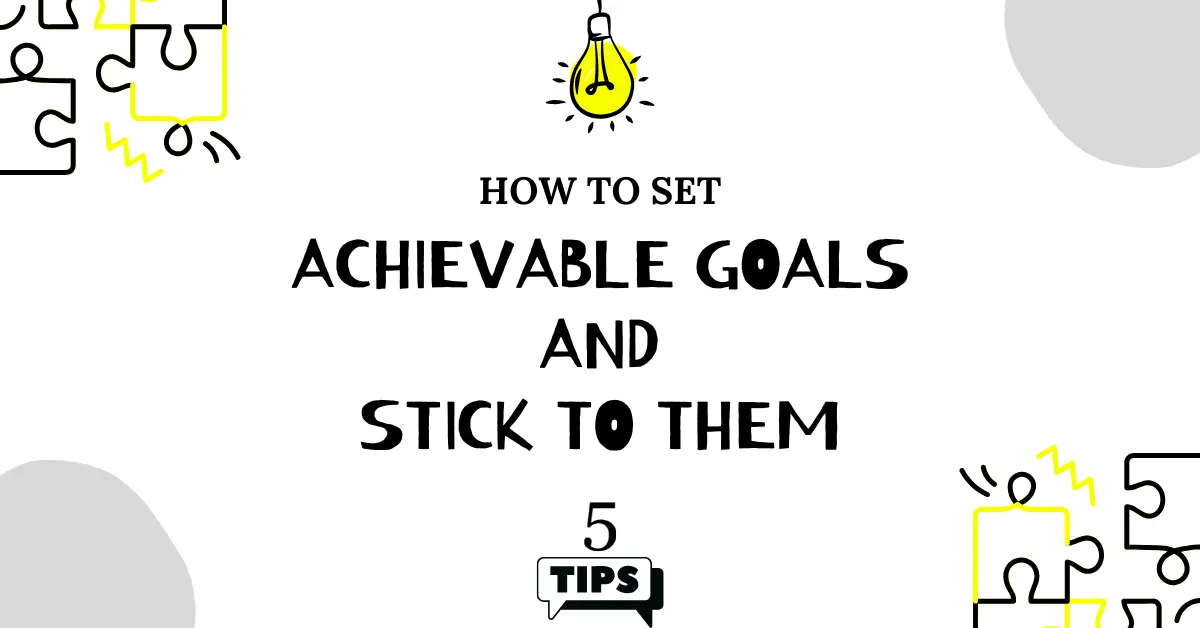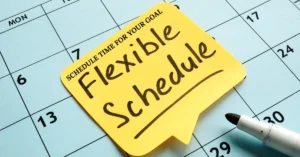
How to Set Achievable Goals and Stick to Them: 5 Tips
- 77
- 0
- 0
Setting achievable goals helps you focus, stay organized, and track progress. Start by choosing realistic and specific goals. Break them into smaller steps and set a timeline. Write them down to make them clear and easier to follow. Staying consistent and celebrating small successes keeps you motivated. Goals are important because they give your efforts direction and purpose, making it easier to achieve what matters to you. They help build discipline, confidence, and a sense of accomplishment. Remember, progress is better than perfection, so stay flexible and adjust as needed while sticking to your plan. Keep moving forward.
How to Set Achievable Goals and Stick to Them: 5 Tips
We all want to achieve our goals, but sometimes it feels like they slip away from us. The good news is that with the right approach, you can turn your dreams into reality. Here’s a complete guide on how to set goals you can actually achieve and maintain your progress over time.
Make Your Goals Specific and Measurable

Setting a clear goal can significantly impact your progress. For instance, instead of saying, “I want to be healthier,” aim for something specific like, “I want to jog 5 kilometers non-stop” or “I want to complete 20 pushups consecutively.” Defining your objectives clearly gives you a precise direction and makes it easier to track and achieve your progress. When your goals are specific, you know exactly what you’re working toward.
Here’s how to make your goals more specific:
- Write down exactly what you want to achieve in simple terms
- Include numbers whenever possible (weight, time, distance, amount)
- Set a clear endpoint so you know when you’ve succeeded
- Focus on one main goal at a time to avoid feeling overwhelmed
For example, if your goal is to save money, don’t just say “I want to save more.” Instead, say “I want to save $5,000 by December 31st.” This gives you a clear target to track your progress against.
Set Realistic Deadlines

Deadlines push us to take action, but they need to be reasonable. Setting a deadline that’s too short can lead to frustration and giving up. On the other hand, a deadline that’s too far away might make you lose interest.
Tips for setting good deadlines:
- Look at your current schedule and commitments
- Think about how much time similar goals usually take
- Give yourself some extra time for unexpected setbacks
- Break your deadline into monthly or weekly targets
- Mark your deadlines on a calendar where you’ll see them often
If you want to learn a new language, giving yourself just one month might be unrealistic. But setting aside six months to reach a basic conversation level could work well.
Break Down Bigger Goals into Smaller Steps

Big goals can feel scary. Breaking them into smaller pieces makes them more manageable and helps you see progress along the way.
Here’s how to break down your goals effectively:
- List all the steps needed to reach your final goal
- Put these actions in order from first to last
- Make each step small enough to complete in a few days or weeks
- Write down what you need for each step (tools, skills, help from others)
- Celebrate completing each small step
Let’s say you want to create a small business. Your smaller steps might include:
- Research your market and competition
- Create a basic business plan
- Set up your business legally
- Build a simple website
- Find your first three customer
Each of these steps feels more doable than thinking about “starting a business” all at once.
Schedule Time for Your Goal

Goals don’t happen by themselves – they need time in your schedule. Block out specific times for working toward your goals, just like you would for any important appointment.
Making time for your goals:
- Look at your weekly schedule and find open spots
- Set aside regular times each week for goal-related tasks
- Start with small time blocks (even 15-30 minutes helps)
- Put these times in your calendar or phone
- Treat this period as important as any other duty
- Find ways to combine goal work with other activities
For example, if your goal is to read more books, you might schedule 30 minutes of reading time during lunch breaks or right before bed. If you want to exercise more, you could wake up 45 minutes earlier three days a week.
Find an Accountability Partner

Having someone who knows about your goals and checks on your progress can make a huge difference. This person can offer support when things get tough and celebrate with you when you succeed.
How to make accountability work:
- Choose someone reliable who wants you to succeed
- Share your specific goals and deadlines with them
- Set up regular check-in times (weekly or monthly)
- Be honest about your progress and challenges
- Ask them to give you gentle reminders when needed
- Offer to be their accountability partner too
Your accountability partner could be:
- A close friend or family member
- A coworker with similar goals
- A mentor in your field
- A member of a goal-setting group
- A professional coach
Extra Tips for Success
Remember these important points as you work on your goals:
- Write everything down – goals, steps, and progress
- Take photos or keep records to see how far you’ve come
- Adjust your goals if needed – it’s okay to make changes
- Don’t give up after small setbacks – they’re normal
- Tell other people about your goals to stay committed
- Reward yourself for reaching milestones
Starting is Often the Hardest Part
The most suitable time to start working on your dreams is now. Don’t wait for the perfect point – it infrequently comes. Pick one goal that matters to you, use these five tips, and take your first small step today.
Remember, everyone can achieve their goals with the right plan and approach. The key is to start small, stay consistent, and keep going even when things get challenging. With these tips and some dedication, you’ll be surprised at what you can achieve.
Be proud of yourself for taking the time to learn about goal-setting. That already shows you’re serious about making positive changes in your life. Now it’s time to put these tips into action and start moving toward your dreams, one step at a time.
FAQs
What makes a goal achievable?
An achievable goal is specific, realistic, and measurable. Break it into smaller steps and ensure it aligns with your abilities, resources, and timeline for better chances of success.
How can I stay motivated while pursuing goals?
Stay motivated by celebrating small achievements, tracking progress, and reminding yourself of your goal’s importance. Surround yourself with supportive people and maintain a positive mindset to stay focused.
Why is writing down goals important?
Writing goals clarifies them, helps you stay committed, and serves as a constant reminder. It transforms vague ideas into actionable plans and increases accountability toward achieving them.
What should I do if I face setbacks?
Treat setbacks as learning opportunities. Reassess your approach, adjust timelines if necessary, and keep moving forward. Stay flexible and remember that progress, not perfection, is the ultimate goal.
How do timelines help in achieving goals?
Timelines create a sense of urgency, helping you prioritize tasks. They provide structure, allowing you to manage your time effectively and ensure steady progress toward achieving your goals.
Also Read:
The 5 Importance of Soft Skills in the Workplace
The Importance of Setting and Achieving Personal Goals
5 Tips on Goal-Setting Techniques
References:
https://en.wikipedia.org/wiki/Goal_setting
https://en.wikipedia.org/wiki/Goal
Disclaimer:
This blog provides general information for educational purposes. It is not professional advice. Always consult an expert for specific guidance. We are not responsible for actions taken based on this content.
Related post

Future of Work: 5 Points on Hybrid Jobs Made Easy

5 Best Skills to Learn for High-Paying Jobs in 2025

